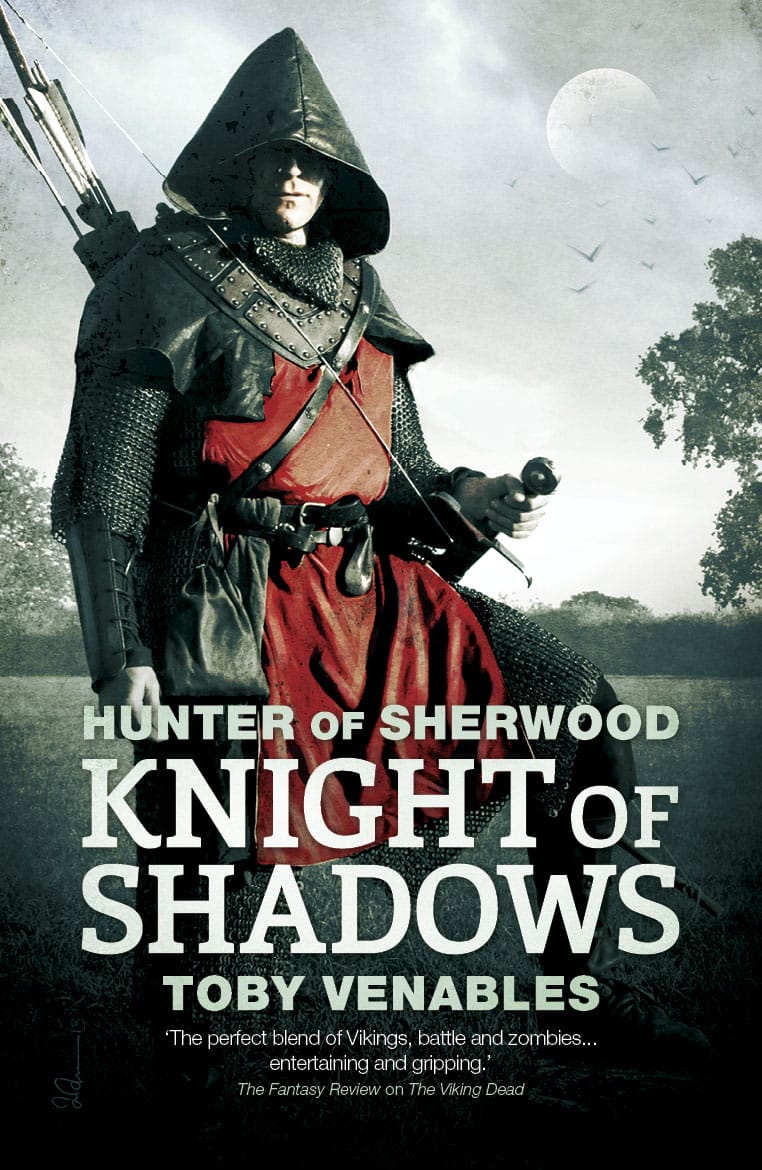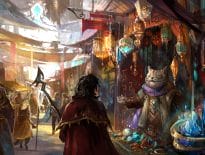Toby Venables’ second novel for Abaddon Books is Hunter of Sherwood: Knight of Shadows. In it Robin Hood is a cold blooded killer and Guy of Gisburne the hero. Intrigued by the concept – everything you know about Robin Hood is a lie – Geek Native asked Toby to comment. Why make Robin Hood the bad guy?
Robin Hood is not the central character of my new novel. That honour belongs to Sir Guy of Gisburne, the traditional villain of the Robin Hood legends – and that fact alone probably gives a pretty good indication of my take on the story. But there’s more to it (I hope) than just turning something familiar on its head, or trashing a cherished legend simply because you can – fun though that undoubtedly is. I wanted proper justification for this dramatic turnabout. And I found it – not in legend, but in real life.
The initial suggestion had come from David Moore, commissioning editor at Abaddon, who published my first novel, The Viking Dead (a Norse zombie saga). He had the idea to make Gisburne a kind of James Bond figure, and approached me as someone who might have an interest in fleshing out the man and his world.
Turning Gisburne into a hero, it turned out, wasn’t the tricky part – even if he was working for Prince John. The big question was how one made Hood into the villain. Because if Gisburne was the good guy and this good guy was fighting Hood, then Hood had to be bad. But how does one make resisting tyranny, standing up for the oppressed and robbing from the rich and giving to the poor a bad thing?
The answer came from history. We all know Richard the Lionheart as he appears in the Robin Hood legends. He is a saintly, almost messianic figure. Traditionally absent for most of the story, fighting in the Third Crusade and then imprisoned by his enemies, his return is anticipated by the oppressed Saxons as a kind of second coming (in 1939 classic The Adventures of Robin Hood, he returns to England dressed in ecclesiastical habits). Like a neo-Arthur, only he, the rightful king, can save his people from the cruelties of the Norman barons and the wicked, opportunistic John, who squeezes ever heavier taxes out of the native population. It’s hard to shake off this image; outside Parliament is an Victorian equestrian statue of Richard, sword drawn, which seems to embody all those noble, Arthurian, heroic virtues.
The reality was quite different. Richard hated England, probably did not speak the language and spent no more than six months of his reign here. The only time he showed enthusiasm towards the place was when he dashed across the channel to attend his own coronation – and as soon as he was crowned, he sold everything that wasn’t nailed down to finance his crusade. He sold Scotland back to the Scottish king who his father had defeated and imprisoned, sold titles to English barons – some retrospectively – and on one occasion said ‘I’d have sold London if I could have found a buyer’. Then, having stripped the country of all available resources, he left for the Holy Land, appointing William Longchamps – a hated Norman who spoke no English whatsoever – to rule in his stead.
No, Richard did not love England – or much else, come to that. The one thing he did love was fighting – besieging castles was a speciality – and he spent most of his life doing it. He fought against his brothers and his own father, and his early campaigns in Aquitaine and neighbouring regions were characterised by stories of atrocities and rebellions against the cruelties of his rule. In time he became a canny commander – bold and fearless, but apparently devoid of anything we might regard as empathy.
So, I asked myself, who would idolise such a king? Well, a man like Hood. My Hood – a man who admires Richard for all the wrong reasons, and all his worst qualities. I began to pose questions. Suppose this Hood, who champions the poor, actually cares nothing for anyone? Suppose he is actually incapable of doing so – a psychopath, as Richard perhaps was – and that he sees life as a neverending quest for power, a great game? Suppose he relishes spreading chaos, doing the very opposite of what society demands – and in doing so comes to be regarded as a rebel hero by its underdogs? Suppose he revels in this adulation, and fosters it, drawing about him a growing army of followers, seeing in them the means to play the game on an ever grander scale? And suppose all those following him never once realise that he just wants to watch the world burn?
I had found my Robin Hood. Brilliant. Charismatic. Unstoppable. And a madman.



